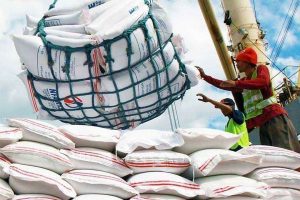
Rice supply deemed sufficient through first six months — DA
THE Department of Agriculture (DA) said the supply of rice will be sufficient during the first half of the year, with supply to include the dry season harvest supplemented by imports.
“We have enough rice, so prices should remain stable through the first half of the year. Our priority now is market stability,” Agriculture Secretary Francisco P. Tiu Laurel, Jr. said on Thursday.
Mr. Laurel said prices may remain elevated until September due to concerns over the impact of El Niño on the global rice supply and “heightened demand for the grain that… is keeping international prices high.”
Palay or unmilled rice production rose 1.5% to 20.06 million metric tons (MT) in 2023. This translates to about 13.2 million MT of milled rice.
The DA has targeted palay production of 20 million MT of palay in 2024, which would be little changed from 2023, to account for El Niño.
The government weather service, known as PAGASA (Philippine Atmospheric, Geophysical and Astronomical Services Administration), has said that the effects of El Niño may last until the second quarter. An estimated 63 provinces will experience droughts or dry spells.
In a bulletin, the DA said that El Niño damage has been valued at P151.3 million, affecting palay and corn in the Western Visayas and Zamboanga Peninsula. The agency estimates that 6,618 MT have been lost, while 3,291 hectares were affected by the dry spell.
“Most of the damage and losses were incurred by rice and corn that are in their reproductive stage,” it added.
The DA has also said that rice import shipments between December and January amounted to 750,000 MT, bolstering domestic supply.
The Philippines imported 3.58 million MT of rice in 2023, according to the Bureau of Plant Industry.
Vietnam, the Philippines’ major source of imported rice, recently signed a five-year agreement to ship 1.5 million to 2 million MT of rice per year through private-sector exporters.
In October, India also gave the Philippines a quota of 295,000 MT of non-basmati white rice, after imposing restrictions on exporting the grain to assure domestic supply is adequate.
The Philippines is projected to remain the world’s top importer of rice, with shipments projected at 3.8 million MT in 2024, according to the US Department of Agriculture.
“What we need to guard against now are profiteers who may attempt to exploit the situation by using El Niño as excuse to hoard rice to push prices to unreasonably high levels,” Mr. Laurel said.
He added that the DA will work with the Department of Trade and Industry and law enforcement agencies to monitor surges in the market price of rice.
The national average price of well-milled rice was P54.42 per kilogram in late January, while regular- milled rice was P49.9 per kilo, according to the Philippine Statistics Authority. — Adrian H. Halili



